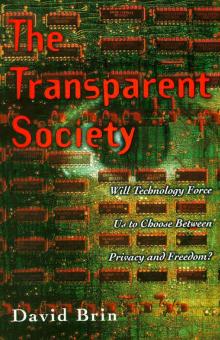The Transparent Society: Will Technology Force Us to Choose Between Privacy and Freedom? 

by David Brin
Genre: Science
Published: 1998
View: 6228
Read OnlineRead The Transparent Society: Will Technology Force Us to Choose Between Privacy and Freedom? Storyline:
In New York and Baltimore, police cameras scan public areas twenty-four hours a day. Huge commercial databases track you finances and sell that information to anyone willing to pay. Host sites on the World Wide Web record every page you view, and “smart” toll roads know where you drive. Every day, new technology nibbles at our privacy.Does that make you nervous? David Brin is worried, but not just about privacy. He fears that society will overreact to these technologies by restricting the flow of information, frantically enforcing a reign of secrecy. Such measures, he warns, won’t really preserve our privacy. Governments, the wealthy, criminals, and the techno-elite will still find ways to watch us. But we’ll have fewer ways to watch them. We’ll lose the key to a free society: accountability.The Transparent Society is a call for “reciprocal transparency.” If police cameras watch us, shouldn’t we be able to watch police stations? If credit bureaus sell our data, shouldn't we know who buys it? Rather than cling to an illusion of anonymity-a historical anomaly, given our origins in close-knit villages-we should focus on guarding the most important forms of privacy and preserving mutual accountability. The biggest threat to our freedom, Brin warns, is that surveillance technology will be used by too few people, now by too many.A society of glass houses may seem too fragile. Fearing technology-aided crime, governments seek to restrict online anonymity; fearing technology-aided tyranny, citizens call for encrypting all data. Brins shows how, contrary to both approaches, windows offer us much better protection than walls; after all, the strongest deterrent against snooping has always been the fear of being spotted. Furthermore, Brin argues, Western culture now encourages eccentricity-we’re programmed to rebel! That gives our society a natural protection against error and wrong-doing, like a body’s immune system. But “social T-cells” need openness to spot trouble and get the word out. The Transparent Society is full of such provocative and far-reaching analysis.The inescapable rush of technology is forcing us to make new choices about how we want to live. This daring book reminds us that an open society is more robust and flexible than one where secrecy reigns. In an era of gnat-sized cameras, universal databases, and clothes-penetrating radar, it will be more vital than ever for us to be able to watch the watchers. With reciprocal transparency we can detect dangers early and expose wrong-doers. We can gauge the credibility of pundits and politicians. We can share technological advances and news. But all of these benefits depend on the free, two-way flow of information.Amazon.com ReviewDavid Brin takes some of our worst notions about threats to privacy and sets them on their ears. According to Brin, there is no turning back the growth of public observation and inevitable loss of privacy--at least outside of our own homes. Too many of our transactions are already monitored: Brin asserts that cameras used to observe and reduce crime in public areas have been successful and are on the rise. There's even talk of bringing in microphones to augment the cameras. Brin has no doubt that it's only a matter of time before they're installed in numbers to cover every urban area in every developed nation.While this has the makings for an Orwellian nightmare, Brin argues that we can choose to make the same scenario a setting for even greater freedom. The determining factor is whether the power of observation and surveillance is held only by the police and the powerful or is shared by us all. In the latter case, Brin argues that people will have nothing to fear from the watchers because everyone will be watching each other. The cameras would become a public resource to assure that no mugger is hiding around the corner, our children are playing safely in the park, and police will not abuse their power.No simplistic Utopian, Brin also acknowledges the many dangers on the way. He discusses how open access to information can either threaten or enhance freedom. It is one thing, for example, to make the entire outdoors public and another thing to allow the cameras and microphones to snoop into our homes. He therefore spends a lot of pages examining what steps are required to assure that a transparent society evolves in a manner that enhances rather than restricts freedom. This is a challenging view of tomorrow and an exhilarating read for those who don't mind challenges to even the most well-entrenched cultural assumptions. --Elizabeth LewisFrom Publishers WeeklyScience fiction writer Brin (The Uplift War) departs from technological fantasy to focus on the social and political ramifications of our information age. While addressing the technology-vs.-privacy debate, he offers an informed overview of the issues and a useful historical account of how current policies evolved. Also beneficial are his descriptions of the different viewpoints on encryption software, online anonymity, the Clipper Chip and techno-jargon. But when Brin opines on these topics, the book suffers from superficiality. He appends remarks to the end of each chapter as this: "When you've been invited to a really neat party, try to dance with the one who brought you." His main point--that information and criticism should flow unrestricted--is lost in a melange of armchair social science theory and unrelated observations on the media, morality, identity and manners. After making a thoughtful case for discouraging encryption and encouraging free speech on the Web, he undercuts his position by calling for e-mail civility, "because people who lash out soon learn that it simply does not pay," then states that a balance can be achieved between these two extremes. Despite a strong beginning, Brin's book ultimately lacks clarity and originality. Copyright 1998 Reed Business Information, Inc.Pages of The Transparent Society: Will Technology Force Us to Choose Between Privacy and Freedom? :